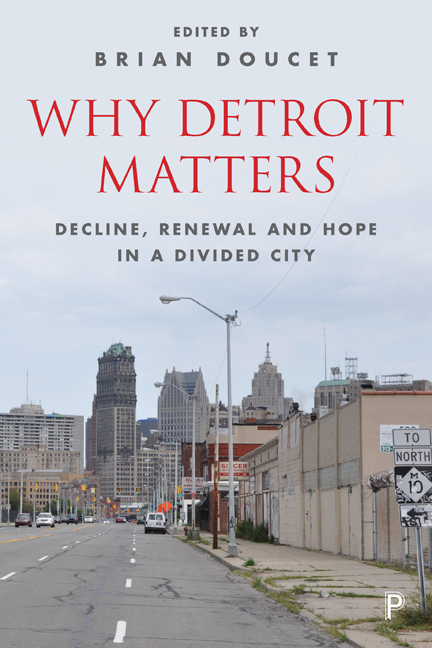Book contents
- Frontmatter
- Contents
- List of contributors
- List of figures and tables
- Acknowledgments
- one Introduction: why Detroit matters
- Section One Lessons from Detroit
- Intermezzo I You may not know my Detroit
- Section Two Practices from Detroit
- Intermezzo II My Detroit
- Section Three Conversations from Detroit
- References
- Index
thirteen - Reawakening culture among Detroit’s resident majority
Published online by Cambridge University Press: 05 April 2022
- Frontmatter
- Contents
- List of contributors
- List of figures and tables
- Acknowledgments
- one Introduction: why Detroit matters
- Section One Lessons from Detroit
- Intermezzo I You may not know my Detroit
- Section Two Practices from Detroit
- Intermezzo II My Detroit
- Section Three Conversations from Detroit
- References
- Index
Summary
While significant attention has been given to professional placemaking and cultural activities in the Greater Downtown Detroit area (see PPS, 2014), far less attention has been paid to cultural activities and organizations in the city's disparate neighborhoods. In this chapter, Jessica Brooke Williams examines cultural instability and neighborhood economies among what she calls Detroit's “resident majority.” She defines this term as those who identify as “black,” “African-American,” or those of African descent who have populated Detroit throughout generations and have comprised the majority of the city's population for almost the last 50 years. The chapter examines five major Detroit planning documents since the Second World War. Today, Williams argues that art, if used primarily as a utility, can be a true catalyst for community revitalization because it provides the opportunity to help rebuild cultural sustenance among Detroit's resident majority. As was also explored by Khalil Ligon (Chapter Twelve), intentionally extending urban planning efforts is important to shaping these cultural efforts. The effects of cultural practices, as demonstrated by the example of the Heidelberg Project (see also Guyton, Intermezzo II) can contribute to shared experiences (healing, learning, growing), values, and goals among Detroit's resident majority.
Jessica Brooke Williams is a graduate of Wayne State University's Master's of Urban Planning program. She is a scholar of American and African diasporic history and art, with a BA from the University of Michigan. Between 2007 and 2012, she was a Project Coordinator at the Heidelberg Project while also serving in positions at other human service organizations, including United Way and the Skillman Foundation. Williams is a member of Detroit's resident majority and is currently a practicing urban planner in program evaluation, land use, and economic development in Detroit.
Culture and its interpreted context
Culture is often used as frontage to help differentiate the environment of one place from that of another. That culture, moreover, is expressed through the behaviors, practices, and beliefs upheld by a group of people with shared experiences and values. These expressions often, if not always, include some visual, auditory, or physical art form interwoven in daily life, and play a continued role in defining that culture and its evolutions.
- Type
- Chapter
- Information
- Why Detroit MattersDecline, Renewal and Hope in a Divided City, pp. 233 - 248Publisher: Bristol University PressPrint publication year: 2017



